Providing best connectivity:
Connectivity is a vital pillar of our strategy. Investing in the right spread of technologies and maintaining and upgrading our network infrastructure helps to ensure that Orange can continue to attract customers with the prom- ise of fast and reliable services, as the de- mand grows for greater quantities of data and higher speeds of transmission. In 2016 we concentrated our efforts on bre technology to keep pace with the demand for high-speed broadband, and we expanded our mobile 4G/ LTE network to accommodate the explosive growth of mobile data trafic.
In 2016, we continued massive development
of fibre lines. In effect, at the end of 2016, almost 1.5 million households in 37 Polish cities were connectable with the fibre network.
The number of households connectable to
VDSL stood at approximately 4.8 million at
the end of 2016. The VDSL range did not
change significantly in 2016, mainly because
we prioritised the fibre network.
The strategy of development of services
based on FTTH lines provides not only for
the construction of the company’s own infrastructure but also for wholesale agreements
with other fibre network operators, wherever
it is technically possible and economically viable. Such agreements were put in place in
2016. The main benefits include quicker access to the FTTH access network and more
efficient use of the existing fibre infrastructure
in the relevant locations. This is in line with the
aims of the Cost Directive of the European
Commission by avoiding duplication of existing facilities. In 2016, Orange Polska signed
two such agreements, namely with Telefonia
Dialog (a wholly-owned subsidiary of Netia
S.A.) and Inea. Under the agreement with
Telefonia Dialog, we will gain potential access
to approximately 114,000 households in the
Łódź Region of Poland, while in case of Inea,
it is approximately 110,000 households located mainly in Poznań (over 80% of the coverage) as well as Konin, Szamotuły and Środa
Wielkopolska. Both agreements will be gradually implemented in 2017.
The most important development in the mobile network was the assignment of radio frequencies from the 800 MHz and 2600 MHz
bands by UKE following completion of the
relevant auction towards the end of 2015.
Thanks to these investments in spectrum, our
4G coverage for all the bands exceeded 99%
of population and more than 90% of Poland’s
territory. LTE services were provided by Orange Polska via over 8,500 base stations.
In an effort to optimise mobile infrastructure development, Orange Polska has been
co-operating with T-Mobile. In 2016, the existing co-operation was expanded to include
equipment operating on the 800 MHz and
2600 MHz bands .The purchase of new spectrum has significantly improved the market
position of Orange Polska. According to an
independent survey by speedtest.pl, Orange
was the fastest mobile broadband network in
Poland.
In the fourth quarter of 2016, Orange Polska
became the first operator in Poland to launch
VoLTE on its network. This enables a higher
quality of voice calls on mobile networks. The
service can be used with selected handset
models, the list of which will be gradually expanded.
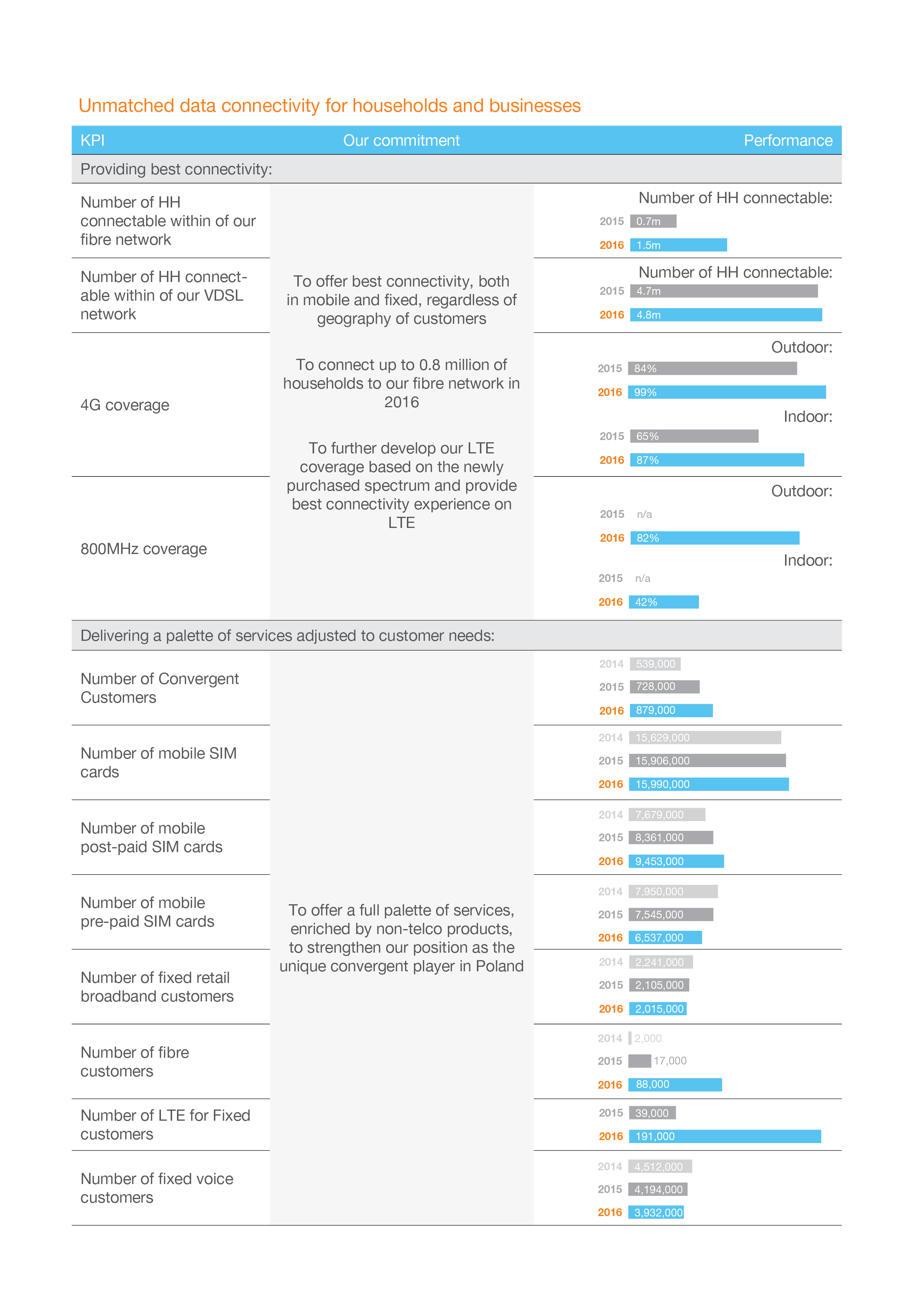
Delivering a palette of services adjusted to customer needs:
Last year was very successful for us with respect to commercial activity on all fronts. We
continued to pursue our convergence strategy as our market differentiator. For mobile
post-paid the year was particularly positive,
on the back of family offers and migration
from pre-paid. In fixed broadband, we managed to trim customer losses mainly due to
expansion in fibre.
Convergent services: strong commercial momentum maintained with 151,000 net additions
One of the key strategic objectives of Orange
Polska is to be the convergence leader, providing mobile and fixed line service bundles.
In 2016, the convergent offer push was one
of the pillars of our marketing activity both in
the consumer market and among business
customers (small to medium enterprises).
Major elements contributing to the scope and
attractiveness of convergent offers included
fibre network rollout and development of a TV
offer based on our own content aggregation,
using IPTV technology.
At the end of 2016 our convergent customer
base reached 879,000, which is an increase
of 151,000 (or 21%) compared to the end of
December 2015. The total number of services
provided in the convergence scheme was almost four million. On average, each convergent
customer uses more than four Orange services.
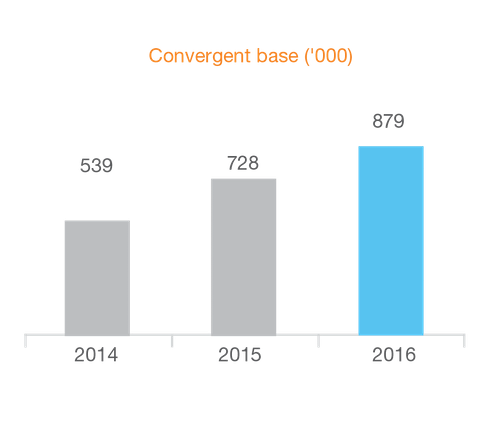
Post-paid mobile: the highest net additions in many years driven by Family offers, mobile broadband and increased migration from pre-paid
In line with the strategic medium term action
plan announced in February 2016, we were
very active in customer acquisition and retention in 2016, carrying out a strong marketing
push with respect to mobile voice and data
services.
As at the end of 2016, we had a mobile services base of 16 million, which is an increase
of 96,000 or 0.6% vs. end of 2015. The slight
growth resulted from a combination of two opposite trends. On the one hand, the post-paid
base experienced spectacular growth of over
1.1 million (or over 13%), which was the highest in many years. On the other hand, there
was a rapid decline in pre-paid SIM cards in
the second half of the year. This was almost
exclusively due to the registration obligation
that was introduced at the end of July 2016.
The growth in post-paid (in both voice and
mobile broadband) was based mainly on the
offers introduced in 2015 and supported by effective marketing. This impressive growth was
mainly fuelled by two market trends: the success of our multi-SIM family offers, and much
higher popularity of mobile broadband for use
in the home (we call it LTE for Fixed). Family
offers are a powerful market tool to win households who use more and more mobile devices.
LTE for Fixed is gaining traction as a substitute
for fixed broadband, especially in suburban
areas, as a consequence of much better mobile connectivity. Another contributing factor to
growth in post-paid was increased migration
from pre-paid following a regulatory change
that obliged users to register their pre-paid
SIM cards. Net additions were well balanced
between business customers, consumers
and machine-to-machine (M2M). Anti-churn
initiatives also proved successful. As a result,
quarterly churn rate in the post-paid segment
decreased to less than 3%, a many years’
low. We performed very well in number transfers from the competition. In post-paid, we
had a net portability balance of over 150,000
in 2016, a major improvement versus 2015
(88,000).
In the pre-paid segment, the introduction of
obligatory registration resulted in much lower
new card activations. In addition, card registration by customers accelerated migration to
post-paid. However, as the vast majority of
new pre-paid activations are low usage onetime activations, the reduction, although very
significant, did not affect our financial performance in a material way.
Fixed line broadband services: customer losses trimmed due to strong fibre take-up
In fixed retail broadband, the number of services continued to fall, though at a much lower rate than in 2015: customer losses totalled
68,000 in 2016 vs. 136,000 in 2015. The decline slowdown can be attributed almost entirely to an increase in high-speed broadband,
where the customer base grew by more than
50%. Major investments in the fibre network
began to bear fruit. It is the key to reversing negative broadband trends in the future.
High-speed internet take-up was further stimulated by migration from ADSL technology,
which is getting increasingly less competitive.
As a result, the share of high-speed services
grew to approximately 25% (from 15% at the
end of 2015).
In 2016, we continued the rollout of the fibre access network. As the fibre service is
a novelty in the Polish market and has low
awareness among consumers, our marketing
efforts were aimed at raising this awareness
and creating demand for the service. The
number of fibre customers at year end stood
at 88,000. The take-up rate improved as the
year progressed: 31,000 in 4Q vs 18,000 in
3Q, 12,000 in 2Q and 10,000 in 1Q.
A major factor in competing for fixed broadband customers is the quality of the TV offer.
To enhance the competitiveness of our offer in
terms of TV content, since February 2016 our
TV offer available to customers using the IPTV
platform has been based on content aggregated by Orange Polska. Content aggregation
means that Orange Polska has been buying
rights to TV channels directly from broadcasters. Before, our offer used to be based on
content reselling. This shift in approach, from
resale to independent content aggregation,
enables greater flexibility in adjusting our TV
portfolio to the needs of customers as well as
development of additional services, such as
catch-up TV, multiroom and multiscreen. Towards the end of 2016, a change in our offer
was introduced for the satellite technology. In
this case, however, our offer is based on partnership with the nc+ platform. Currently, our TV
offer is the same regardless of the distribution
technology. At the end of 2016 we had 766,000
customers of our TV offering.
Fixed line voice services continued to be affected by unfavourable trends
Performance of PSTN continues to be affected by unfavourable demographic trends, partial
regulation and mobile substitution. Nevertheless, structural decline slowed down with net
loss of lines at 259,000 versus 318,000 in the
previous year.
Optimal sales channel mix
Optimisation and enhancement of remote sales channels
Our key objectives include further development of our on-line sales channel and
cross-channel initiatives as well as the optimisation and modernisation of our sales outlets
to align with market and consumer trends, as
this is directly reflected in customer satisfaction and further efficiency gains.
We continued the process of closing under-performing points of sale last year. As a
result, the total number of points of sale, either
our own or operated by agents, was reduced
by 39 to 755 at the end of 2016. Furthermore,
we have been gradually modernising our
points of sale. We continued adding Smart
Stores to provide customers with convenient,
friendly and innovative spaces for settling any
matters related to our telecommunication services. There were 12 of them at the end of
2016.
In addition, we have invested in a new store
format: Fibre Shops. These are stores located
close to housing estates within the FTTH network reach, which combine image-building
and sales functions and are dedicated to our
fibre offer. We operated 38 such stores as of
the end of 2016.
The total number of traditional stores is greatly expanded by chains of independent distributors, such as Media Markt, Saturn and
Neonet. Through this co-operation we are
present in 740 additional points of sale, offering a complementary service to consumers
interested in buying a device.
In line with market trends, our on-line sales
are a rapidly growing channel. In connection
with our fibre offer, we have introduced an
option to check the network reach and shortened the purchase process. Owing to gradually implemented cross-channel solutions,
the co-operation between all our contact
channels ensures a uniform, seamless customer experience at any time and any place.
The telesales channel is also used to contact customers (mainly for retention and
cross-selling), while the product and agreement are subsequently delivered by courier
free of charge or picked up in store. However,
currently telesales are used mainly to support
online sales conversion. In addition, following
our considerable investments in the FTTH
network rollout we have continued to develop
our door-to-door sales channel, which is the
most effective way to compete with cable operators and sell our fibre services.
Making the customer journey easy and friendly
Focus on improving customer satisfaction
We strive to build long-standing relationships
with our customers. We focus on improving
customer satisfaction in order to enhance
their loyalty and trust, mitigate churn and increase revenue. Already in 2016 over 90%
of customers are satisfied with our customer
care and over 72% of customers would recommend our services.
For another year in a row, we maintained the
prestigious international COPC certificate,
which confirmed our high efficiency and top
standards in customer care management.
Over the last three years, the implementation
of these uniform standards has brought us
tangible business benefits: an increase in satisfaction from customer service by 11 pp, and
an increase in first contact resolution (FCR) by
15 pp.
In our customer communications we follow the
“Listen & Respond” approach based on listening to and understanding the customer needs:
-
we write in a more friendly manner
-
we respond in a simple language, understandable to any customer
-
we educate customers about our services and self-management
-
we resolve problems at once: 9 out of 10 issues are resolved at first contact.
User-friendly contact channels
We provide highly cost-effective and top
quality contact channels, which are adjusted
to customer needs. As part of constant improvement of our contact channels, last year:
-
We simplified and shortened IVR on all our
customer service infolines, with dedicated
services path for senior clients and facilities
for clients with disabilities.
-
In using Facebook for customer care, for
the fifth year in a row we remained Poland’s leader and within top ten worldwide
(according to Socialbakers’ list of the most
socially devoted brands);
-
We implemented the ‘Our Orange’ social
platform based on cutting-edge technology, and it was visited by over half a million
users in the first six months.
-
We regularly upgraded the ‘My Orange’
mobile app, which in addition to self-service offers free contact with consultants
with a single click (Click-2-Call and Click-2-
Chat functionalities).
-
We expanded the ‘My Orange’ section of
our website, through which customers can
quickly and easily manage accounts, pay
invoices or activate additional services
themselves without the need to contact an
advisor.
Our frontline sales and customer care employees have been provided with a single,
common tool for customer relationship management (CRM), the Omni system. It will ultimately replace all the existing sales and customer service systems. When using Omni,
sales and customer care staff can carry out
processes in the same manner as customers
logged to ‘My Orange’ do. The new tool will
facilitate and accelerate a number of customer service operations which have hitherto
required the simultaneous use of several systems. Ultimately, this tool will be made available to our customers as well.
Last year we completed the ‘Convergent
Offer Tool’ project, which involved the implementation of Europe’s largest billing solution,
the Oracle Billing and Revenue Management
(OBRM) system. Three million customers
have already been migrated onto this system. The billing system optimisation has had
a positive impact on quality, billing time and
invoice delivery (including convergent distribution) as well as the receivables turnover
ratio. The change will also reduce the system
maintenance costs.
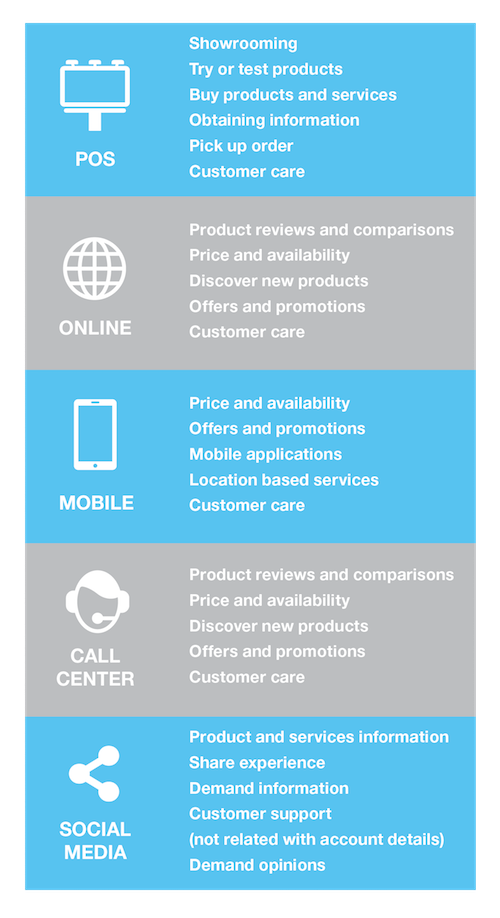
Focus on efficiency
In Orange Polska we focus on the process of
optimising the company to adapt to a more
demanding telecom market. Our ambition is
to be an agile company, digital and flexible,
with a strong online presence and highly automated processes, as well as a proven ability
to cut indirect costs and find efficiency savings.
Our strategy assumes maintaining high level
of direct costs, which encompass mainly expenses related to customer acquisitions and
retentions as well as interconnect costs related to customers activity, and a decrease in
indirect costs – that include all labour costs,
IT, network and all sorts of general expenses.
 Our 2016 cost evolution reflected this approach: our indirect costs were down 4% and
our direct costs were up 6%. The most significant implemented cost saving initiative was
related to realisation of the Social Agreement
for the years that was concluded in December 2015.
Our 2016 cost evolution reflected this approach: our indirect costs were down 4% and
our direct costs were up 6%. The most significant implemented cost saving initiative was
related to realisation of the Social Agreement
for the years that was concluded in December 2015.
 Pursuant to the Agreement a total
of 1,030 employees left the Group in 2016,
94% of whom under the voluntary departure
programme.
Pursuant to the Agreement a total
of 1,030 employees left the Group in 2016,
94% of whom under the voluntary departure
programme.
Other important efficiency initiatives introduced in 2016 include:
-
Energy consumption optimisation project
-
Car fleet optimisation including cars reduction, lower rental costs and lower maintenance costs
-
Postal costs optimisation through diversification of services providers and rising e-invoice dispatch
-
Optimisation of technical partners costs.
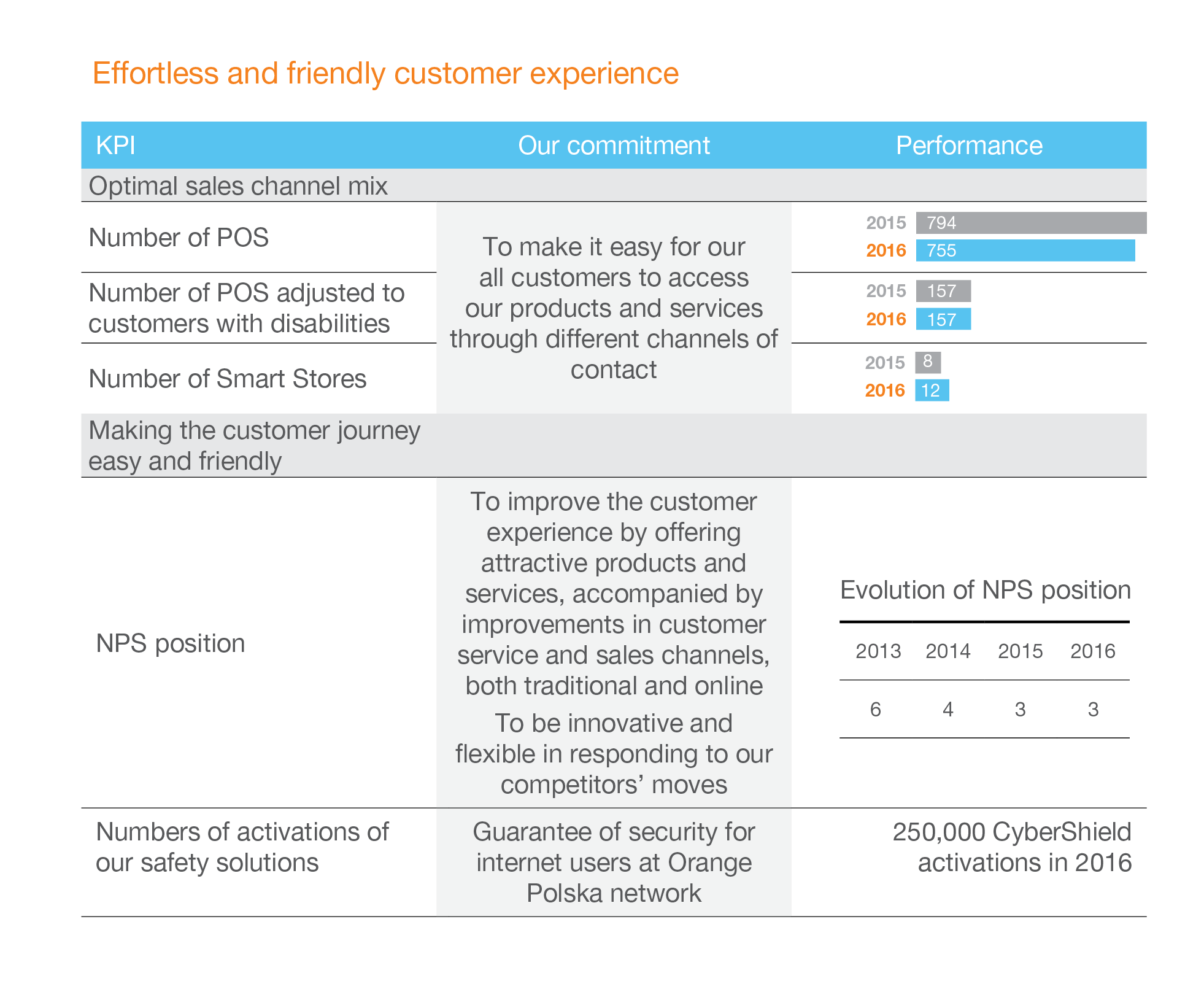
Management of the impact on the environment
Use of new technologies is a huge opportunity
on the one hand, in terms of the development
of social or economic life and for finding more
eco-friendly solutions; on the other hand, it
presents a challenge when it comes to the
rapid outdating of products and increased
demand for energy. It poses a problem of utilisation of devices that are no longer wanted
and provokes us to think about eco-efficiency
inside the company as well as relations with
our suppliers. It also means educating customers and encouraging them to return ICT
devices they no longer use.
We try to maximise our positive impact on the
environment and minimise our negative influence. Within environmental protection policy
we supervise compliance of our operations
with the law and other regulations regarding
ecology, we control negative impact of our
processes on the environment and we plan
actions that enable its reduction.
All our energy saving initiatives, including
some designed by our own employees, have
been combined into a single programme,
‘Energy Optimisation’. To date, Orange Polska has launched almost 100 such initiatives,
which generated total energy savings of 145.0
GWh between 2014 and 2016 (and will generate savings of 96 GWh annually after all the
projects are completed). It means an overall
reduction of 118,802 tonnes in carbon dioxide emissions. As a result of these actions,
the company’s total electricity consumption
decreased by 6% in 2014- 2016, despite new
investments related to the development of
our services.
We try to reduce the amount of materials we
use in our operations and to reuse them rather than dispose of them. We encourage our
customers to recycle old mobile devices: a
buy-back programme for unwanted mobile
phones is one of our key environmental initiatives. It is also possible to get rid of old mobile
phones and accessories, free of charge, in
Orange stores.
Multimedia devices, such as modems, settop-boxes are leased to customers for the
term of their telecommunication service
agreements. Thanks to that, products which
are not yet at the end of their life cycle, are
re-launched, while avoiding the need to purchase new ones.
Orange Polska refurbishes returned devices
which have not reached the end of service
life, putting them back on the market.
 416,516
handsets, notebooks and tablets refurbished
and reintroduced onto the market, accounts
for ca 48% of the total distribution for Romania
and Polska. 182 267 were refurbished for
OPL’s needs, which constitutes 28% of
broadband distribution in Poland.
416,516
handsets, notebooks and tablets refurbished
and reintroduced onto the market, accounts
for ca 48% of the total distribution for Romania
and Polska. 182 267 were refurbished for
OPL’s needs, which constitutes 28% of
broadband distribution in Poland.
Appropriate supervision over our operations
is ensured by our Environmental Management System, which is consistent with the
ISO 14001 standard for mobile telephony services.
Impact on Society
Universal internet access contributes to equal
opportunities and helps people from disadvantaged social groups to reach their full
potential. But first we need to eliminate the
social barriers that restrict people’s access
to knowledge, culture and education through
digital technology.
In order to facilitate access to information,
knowledge and technology among local communities, we have developed Orange Studios. Orange Studios are public multimedia
studios in small towns and villages, which we
create and help to manage. The purpose is to
provide members of local communities with
access to new technologies, courses and
workshops. Leaders of the studios are provided with professional training and financial
aid to help them manage these modern and
attractive meeting places. 77 studios have
been created across the country up to now. In
addition, we have launched an online knowledge-sharing platform for Orange Studio
users. It features a portfolio of ready-to-implement projects and a gamification module
that uses game mechanisms to foster social
competence and motivate residents to work
for the benefit of their neighborhoods. The initiatives are aimed at different target groups:
children and youth, people with disabilities,
young mothers and senior citizens. We estimate that 600,000 people use Orange Studios per annum. In 2017 we plan to open 25
new studios.
We want the youngest children to be safe and
conscious users of multimedia and we want
teachers to have access to quality materials
enabling them to conduct modern classes
after school. Therefore we have launched
MegaMission, a nationwide educational
programme for primary schools offering after-school care. It is addressed to teachers
and kids aged 6 to 10, who spend time in after-school facilities. Through this programme
we expand educators’ knowledge about the
ten key areas of development of media, digital and IT competence. While analysing social
needs, we were looking for space in schools
that would enable digital education of children in an innovative form outside regular
lessons to supplement the core curriculum
recommended by the Ministry of National
Education. We have identified such space in
after-school clubs, where kids spend time before and after their lessons. 350 schools and
6,750 children participated in the MegaMission classes in 2016.
In 2016 we launched a pilot of #SuperCoders,
an education programme to teach coding,
aimed at primary schools and students aged
9-12. The pilot was conducted in 35 schools
from all over Poland. We plan a full edition of
the programme in 2017 with 100 schools involved.
One of the most important issues for us is the
safety of children and young people on the internet and the preparation of young people for
the conscious use of new media. These activities are carried out under the programme
Safety Here and There, which combines the
educational activities of the Orange Foundation with all our services related to customer
safety. This programme provides and supports education on children’s online safety in
schools and kindergartens all around Poland.
Every year within the programme the Orange
Foundation in co-coperation with Empowering Children Foundation offers many educational tools and materials such as e-learning
and educational websites, online brochures
and guidelines for pupils, parents and teachers. In 2016 our educational materials reached
662,000 children. Adults (especially educators and specialists) can participate in conferences, seminars and workshops. We created
a special online interactive guide for parents
and guardians teaching them how to protect
their children online and better understand
their fascination with digital technologies. In
2016 it had 33,000 users.
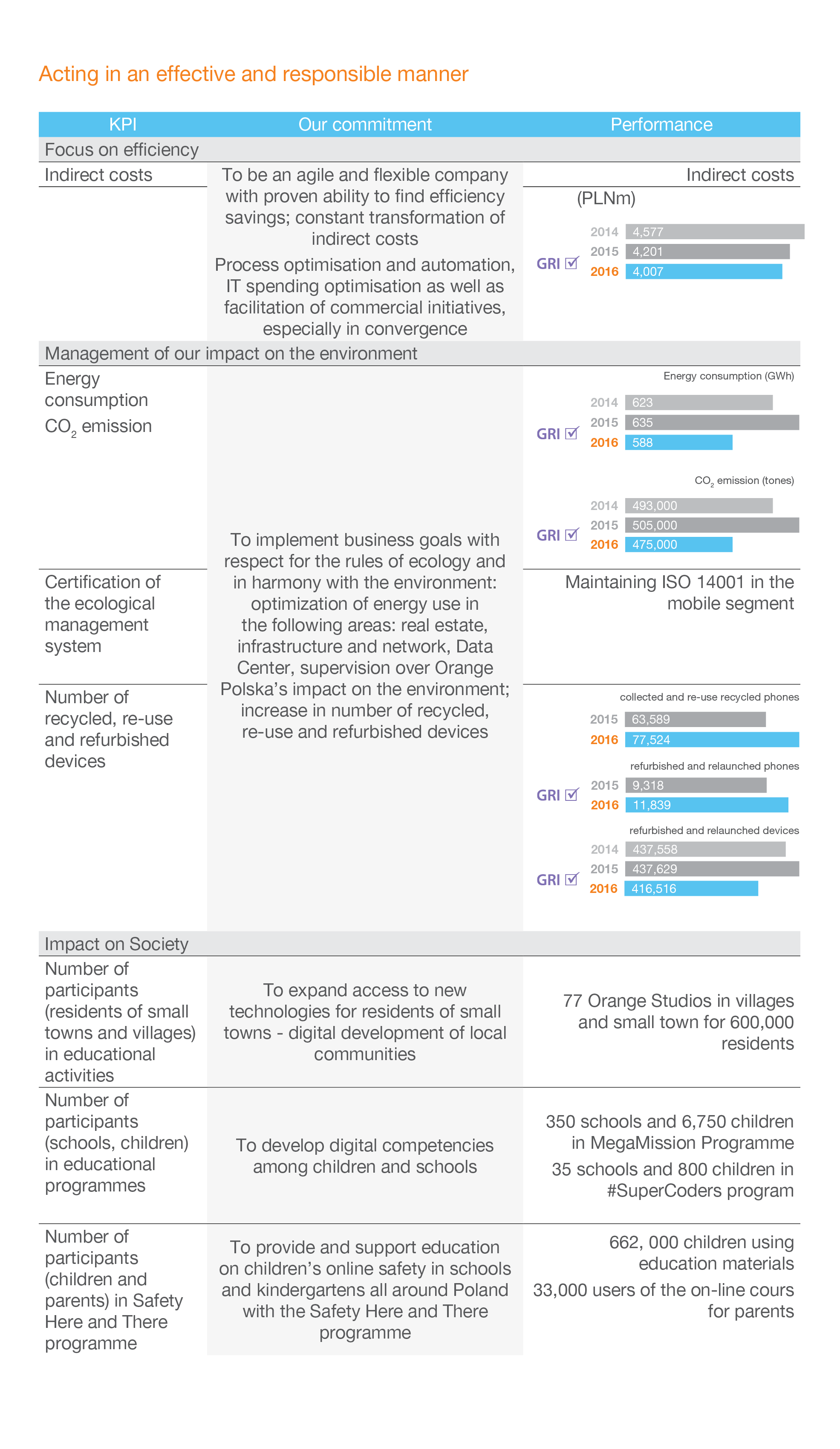
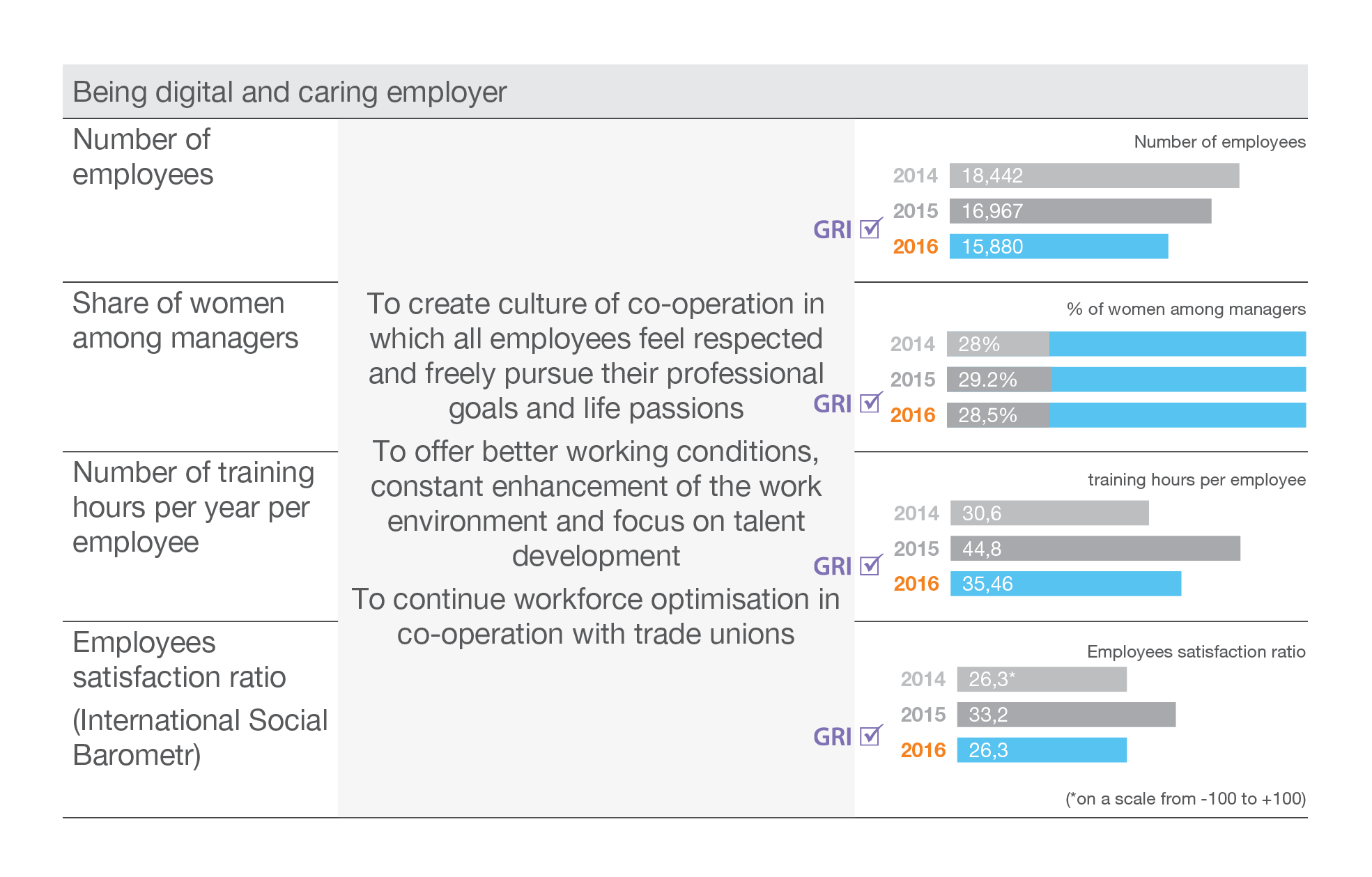
Being digital and caring employer
At Orange Polska we believe that the investment we make in our people is fundamental
to our business activity, achieving our strategy and improving our competitive edge.
Employee engagement and development is
essential to ensure that we deliver the best
customer experience and increase our business performance. In Orange Polska we want
to create a culture of co-operation in which all
employees feel respected and freely pursue
their professional goals and life passions.
Orange Polska again among top employers
In 2016 we focused on building Orange Polska’s image as one of the best employers in
Poland. We received several awards in 2016,
including the Top Employers Polska certification and Top Employers Europe title. Our high
ranking among Polish companies reflects our
commitment to better working conditions,
we follow transparent rules and criteria of candidate selection. Decisions to recruit particular
employees are based on their qualifications and
professional experience. We ensure that candidates represent diverse communities. In terms
of leadership, the diversity requirements include
care for the diversity of decision-making bodies
within the Company. In complementary action
plans to the Policy, we have assumed a requirement for analysis of management and supervisory bodies in terms of diversity with respect to
such aspects as age, gender, education or professional experience.
Training
We have a number of training programmes,
which aim to develop competence and prepare employees to face strategic challenges.
Our employees increase their qualifications and
language skills, and are eligible for financing
of graduate or postgraduate studies, including
MBA. We have Professional Schools in different
areas that offer opportunities for professional
improvement and development. Employees are
taught by company experts. Currently there are
seven Professional Schools in areas such as
sales, operations or marketing.
We promote knowledge sharing programmes,
such as Knowledge Highway, which supports
the development of a know-how sharing culture among Orange Polska’s internal experts.
80 experts are involved in the programme. They
constant enhancement of the work environment and our focus on talent development.
Satisfaction surveys among our employees
only confirm this status. In 2016, the score for
being proud of working for Orange was 46.8
(on a scale from -100 to +100) and the score
for recommending Orange as a good place to
work was 36.9.
Adoption of clear employee evaluation criteria and implementation of equal opportunities
principles are among the key conditions for the
functioning of a socially responsible company.
In September 2016 Orange Polska adopted
a Diversity Management Policy. Our Diversity
Management Policy supports the achievement
of our business objectives, addresses changes
in the labour market and responds to the expectations of our employees. The key diversity
dimensions in Orange Polska identified in its Diversity Management Policy are as follows: gender; age; competence / expertise / experience
/ way of thinking; psychophysical skills – (dis)
abilities; parental status. Other diagnosed dimensions include: religion / beliefs; workplace
location (HQ vs. region); type of employment;
nationality / ethnic origin.
With respect to administering, managing and
supervising bodies, the rules specified in the
Policy include proper selection of employees
and leadership. In the recruitment process,
we follow transparent rules and criteria of candidate selection. Decisions to recruit particular
employees are based on their qualifications and
professional experience. We ensure that candidates represent diverse communities. In terms
of leadership, the diversity requirements include
care for the diversity of decision-making bodies
within the Company. In complementary action
plans to the Policy, we have assumed a requirement for analysis of management and supervisory bodies in terms of diversity with respect to
such aspects as age, gender, education or professional experience.
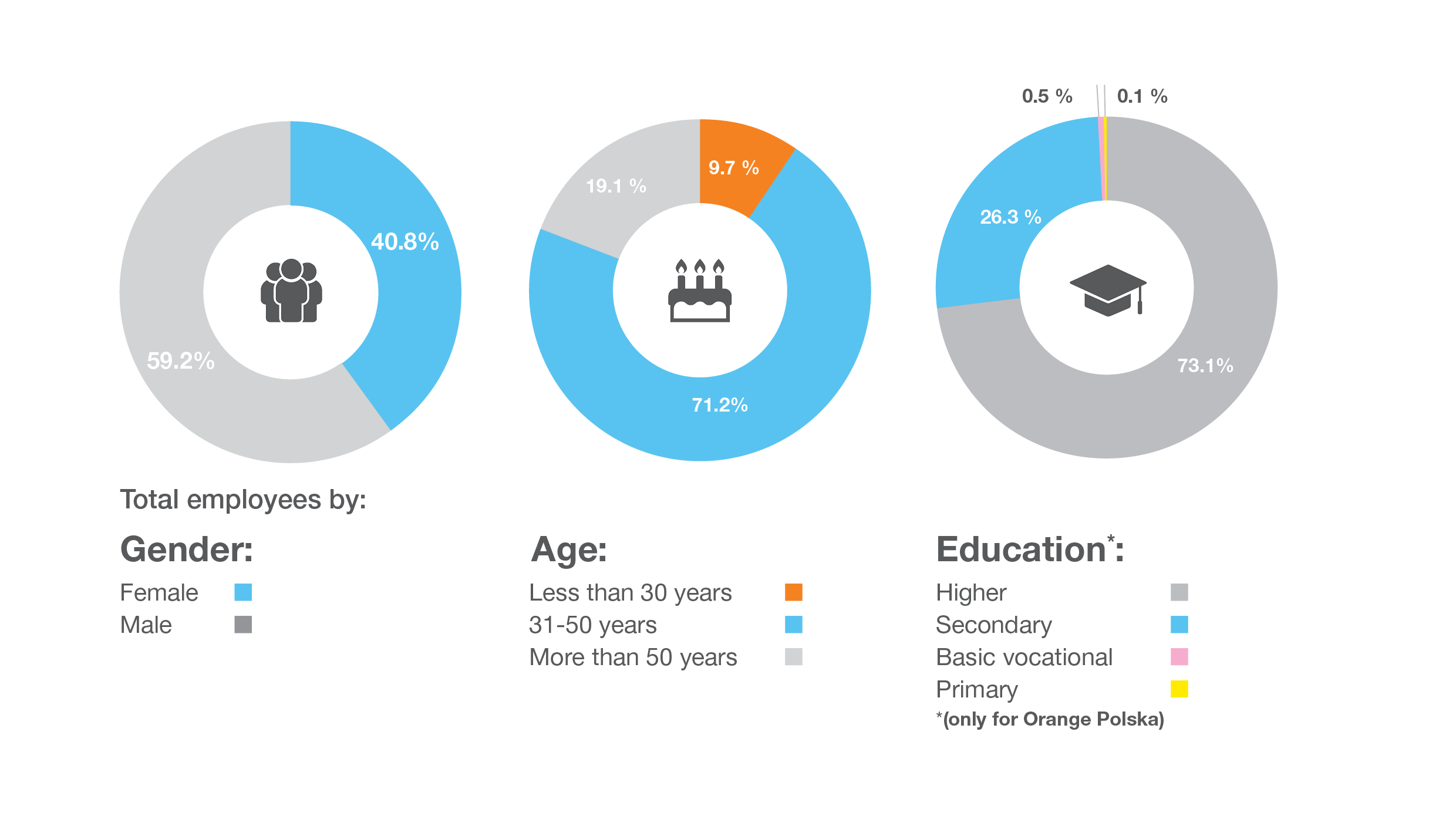
We have a number of training programmes,
which aim to develop competence and prepare employees to face strategic challenges.
Our employees increase their qualifications and
language skills, and are eligible for financing
of graduate or postgraduate studies, including
MBA. We have Professional Schools in different
areas that offer opportunities for professional
improvement and development. Employees are
taught by company experts. Currently there are
seven Professional Schools in areas such as
sales, operations or marketing.
We promote knowledge sharing programmes,
such as Knowledge Highway, which supports
the development of a know-how sharing culture among Orange Polska’s internal experts.
80 experts are involved in the programme. They prepare their own development plans and conduct classroom and e-learning training courses, inspiration sessions and specialist lectures
in technology, telecommunications and project
management.
We have a programme that identifies and develops managerial talents. It supports people with
initiative, concrete achievements and management potential, who develop constructive relations with other people, act in accordance with
Orange values and who are committed and willing to take on new challenges. People from the
Talent Group are taken into account at the first
stage of recruitment for managerial positions.
They may be covered by dedicated development programmes. They also have an opportunity to participate in projects that are critical for
the company.
We have launched an international development
programme, to promote uniform management
standards across the Orange Group. It is offered
to all managers in the Group. It has been based
on a development model that involves sharing
experience. Orange Campus has three international training centres in Poland, France and
Spain. 91% of Orange Polska managers have
already participated in at least one such training
course. So far, Orange Campus training sessions have been attended by more than 5,500
participants.
The company follows the employee Development& Assessment (D&A) process, whichcombines annual evaluation results with the
employee's career development plans; it alsoinvolves progress monitoring throughout
theyear and accounts for Orange values in theemployee assessment.
-
 97.2 % of employees evaluated
97.2 % of employees evaluated
-
 81.3 % of employees with individual development plans
81.3 % of employees with individual development plans
-
 21,946 development activities scheduled
21,946 development activities scheduled
The same process also covers 3 101 of our
outsourced staff. 99.8% of them completed
the process and for 75.4% of them obtained a
development plan.
A bonus is a variable remuneration component that depends on the work results. All
employees are eligible to variable bonus.
Individual groups of employees, depending on their responsibility, are subject to
the relevant rules of the bonus system.
The bonus goals for the employees depending on the group they are located in are set
and settled in one of the following periods:
monthly, quarterly, semiannually.
Continuing workforce optimisation through social dialogue
We respect the employees’ right to associate and we run regular broad dialogue with
our social partners. The most important issue
for discussion with trade unions is the Social
Agreement. This document regulates, among
others, the rules for concluding and terminating job contracts, working hours, holiday entitlement, rules of remuneration and obtaining
extra benefits connected with work, occupational safety and health issues, training, social
care and health care.
2016 was the first year of implementation of
an agreement with trade unions, signed in
December 2015, which allowed for 2,050 voluntary departures in 2016–2017. We have a
long track record of successfully adapting to
market conditions: from over 68,000 full time
employees in 2001 – the legacy of our former role as the state-owned national telecom
provider – we have completely realigned our
workforce to the realities of the telecom market in 2016 and beyond.
Volunteering programme allows socially conscious people to share their knowledge and positive energy with others
In Orange Polska we have the biggest employee volunteering programme in Poland. It
has been running for 14 years. It is organised
by Orange Foundation in co-operation with
Orange Polska and engages about 3000 volunteers each year. The programme is based
on Competence volunteering. Our employees
share their knowledge, skills and experience
and teach children and seniors how to use
the internet safely and wisely. Moreover, Orange volunteers create Fairy Tale Corners for
children: colourful and friendly spaces to learn
and play in places such as hospitals, hospices and single mothers' homes. Every year
around Christmas our volunteers play Santa
and visit kids in hospitals and orphanages.
Our employees take part in important social
actions and in events organised by Orange
Polska (e.g. Orange Warsaw Festival). Orange
volunteers may develop their own volunteering project and apply for a grant for its implementation. Every year we award grants to
approximately 100 local projects.
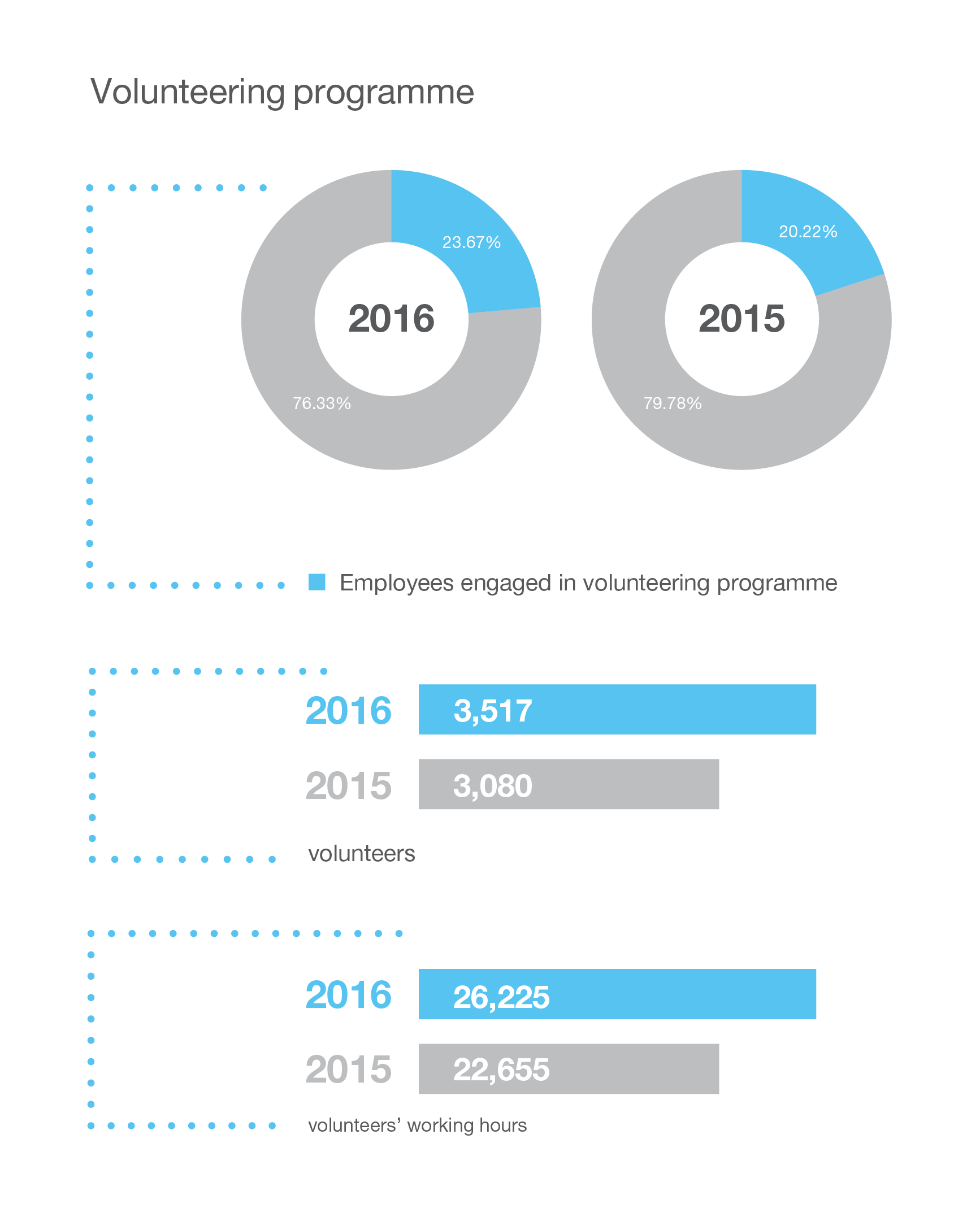





 Our 2016 cost evolution reflected this approach: our indirect costs were down 4% and
our direct costs were up 6%. The most significant implemented cost saving initiative was
related to realisation of the Social Agreement
for the years that was concluded in December 2015.
Our 2016 cost evolution reflected this approach: our indirect costs were down 4% and
our direct costs were up 6%. The most significant implemented cost saving initiative was
related to realisation of the Social Agreement
for the years that was concluded in December 2015.
 Pursuant to the Agreement a total
of 1,030 employees left the Group in 2016,
94% of whom under the voluntary departure
programme.
Pursuant to the Agreement a total
of 1,030 employees left the Group in 2016,
94% of whom under the voluntary departure
programme.
 416,516
handsets, notebooks and tablets refurbished
and reintroduced onto the market, accounts
for ca 48% of the total distribution for Romania
and Polska. 182 267 were refurbished for
OPL’s needs, which constitutes 28% of
broadband distribution in Poland.
416,516
handsets, notebooks and tablets refurbished
and reintroduced onto the market, accounts
for ca 48% of the total distribution for Romania
and Polska. 182 267 were refurbished for
OPL’s needs, which constitutes 28% of
broadband distribution in Poland.


 97.2 % of employees evaluated
97.2 % of employees evaluated
 81.3 % of employees with individual development plans
81.3 % of employees with individual development plans
 21,946 development activities scheduled
21,946 development activities scheduled
